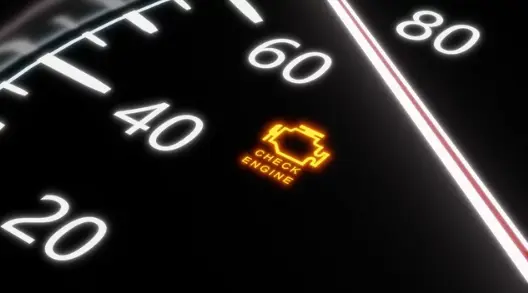You’re cruising along, enjoying the drive, when suddenly, that dreaded check engine light pops up on your dashboard. Don’t panic! Let’s delve into the top reasons why your check engine light may be on and how you can tackle these issues head-on.
1. Is Your Gas Cap Loose or Damaged?
Sometimes, a loose or damaged gas cap can trigger the check engine light to illuminate. This might seem like a minor issue, but it can impact your vehicle’s fuel efficiency and emission levels. Thankfully, fixing this problem is as simple as ensuring your gas cap is securely fastened after refueling. By tightening or replacing the cap, you might just bid farewell to that pesky check engine light.
If you’ve recently filled up the tank and notice the light appearing shortly after, the gas cap is a likely suspect. The cap creates a sealed environment for the fuel system, and any breach can lead to issues that alert the car’s computer system. So, before you rush to the mechanic, try this quick fix first!
Remember, the check engine light serves as an early warning system for your vehicle. Tackling minor concerns promptly can prevent them from snowballing into more significant problems down the road. Don’t dismiss the importance of checking your gas cap – it’s a small part that plays a big role in keeping your engine in top condition.
2. Common Culprits: Oxygen Sensor Issues
Oxygen sensor malfunctions are a prevalent reason for the check engine light to come on. These sensors monitor the level of oxygen in the exhaust gases, helping regulate fuel mixture for optimal performance. When an oxygen sensor fails, it can lead to decreased fuel efficiency and increased emission levels – both harmful to your vehicle and the environment.
Ignoring oxygen sensor problems can result in long-term damage to your engine and catalytic converter – costly repairs you’d want to avoid. If your check engine light indicates an oxygen sensor issue, consider seeking professional assistance to diagnose and rectify the problem promptly.
Given the vital role oxygen sensors play in your vehicle’s performance, addressing any malfunctions swiftly is crucial. Don’t overlook the significance of these small yet mighty components in ensuring your engine operates efficiently and cleanly.
The next time your check engine light hints at oxygen sensor troubles, take it as a signal to prioritize your car’s well-being. By resolving these issues promptly with the help of Pete Nelson Automotive, you not only enhance your driving experience but also contribute to a healthier environment for all.
3. Ignition System Problems: A Likely Cause
Your vehicle’s ignition system plays a pivotal role in starting the engine and keeping it running smoothly. When components like spark plugs, ignition coils, or the battery begin to falter, it can trigger the check engine light to signal trouble. Ignoring ignition system issues can lead to poor engine performance, stalling, or difficulty starting the car.
If you encounter ignition system problems, addressing them promptly is key to preventing further damage. Neglecting these issues can not only leave you stranded at the most inconvenient times but also result in hefty repair bills. Trust your instincts – if the check engine light hints at ignition system woes, it’s time to take action! Contact Pete Nelson Automotive at 623-974-4723 for a comprehensive diagnosis and repair.
4. Catalytic Converter Concerns
The catalytic converter is a critical component responsible for reducing harmful emissions from your vehicle. Issues with the converter, such as clogging or failure, can trigger the check engine light and compromise your car’s environmental friendliness. Ignoring catalytic converter problems can lead to decreased fuel efficiency and further damage to the exhaust system.
If your check engine light comes on due to catalytic converter issues, it’s crucial to address them immediately. For expert assistance, call Pete Nelson Automotive at 623-974-4723. Our skilled technicians can provide the necessary repairs to keep your vehicle running clean and efficient.
5. Don’t Ignore the Dashboard Warnings: Misfiring Engine
A misfiring engine is a serious issue that demands immediate attention. When your engine misfires, it indicates a problem with the combustion process, potentially due to issues like faulty spark plugs, fuel injectors, or compression problems. Ignoring engine misfires can lead to permanent damage, reduced efficiency, and even safety hazards on the road.
If your check engine light flashes or remains on steadily, coupled with engine shuddering or rough idling, it’s imperative to address the misfiring promptly. Seeking professional assistance from Pete Nelson Automotive to diagnose the root cause can prevent further complications and keep your engine running smoothly.
6. Sensors and Their Impact on Your Check Engine Light
Modern vehicles rely on a myriad of sensors to monitor various systems and ensure optimal performance. Any irregularities detected by these sensors can trigger the check engine light, signaling the need for attention. From detecting engine temperature and oil pressure to monitoring emissions and air-fuel ratio, sensors play a crucial role in maintaining your vehicle’s health.
Keeping these sensors in top condition is essential for the overall well-being of your car. Regular maintenance and prompt sensor replacements when necessary can prevent inconvenient breakdowns and costly repairs. Remember, the small sensors scattered throughout your vehicle are the silent guardians of its operational efficiency.
7. Timing Belt Troubles: A Sneaky Culprit
The timing belt synchronizes the rotation of the camshaft and the crankshaft in your engine, ensuring that valves open and close at the right times. A worn or damaged timing belt can lead to engine misfires, strange noises, or even complete engine failure. If your check engine light highlights timing belt issues, immediate action is crucial to prevent severe engine damage.
Regular inspection and timely replacement of the timing belt as per your manufacturer’s recommendations can safeguard your engine’s health and longevity. Don’t underestimate the importance of this seemingly small component – it plays a significant role in maintaining your engine’s precise timing and performance.
8. When the Water Pump Fails: A Warning Sign
The water pump circulates coolant through your vehicle’s engine, preventing overheating and ensuring optimal operating temperature. A failing water pump can result in engine overheating, coolant leaks, and potential engine damage. If your check engine light signals water pump issues, addressing them promptly is crucial to avoid costly repairs and engine overheating.
Regular monitoring of your vehicle’s cooling system, including the water pump, can help you catch potential problems early on. Timely water pump replacement and coolant system maintenance are essential steps in preserving your engine’s health and preventing unexpected breakdowns.
If your check engine light is on and you’re unsure what to do next, contact Pete Nelson Automotive for professional assistance. Our team of skilled technicians is ready to diagnose and address any issues your vehicle may have. Call us today at 623-974-4723 or visit our shop in Sun City, Arizona. Trust Pete Nelson Automotive to keep your car running smoothly and efficiently!



